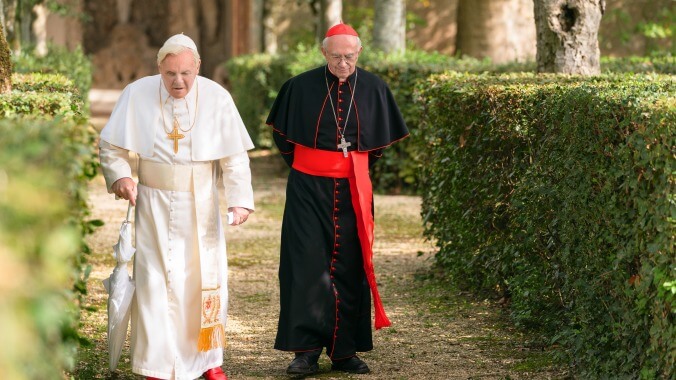The Two Popes dreams up an unconvincing talk between the Vatican’s most recent residents

Benedict XVI’s decision to resign six years ago, thereby becoming the first living ex-pope since the 15th century, stunned Catholics worldwide. The College Of Cardinals then created another shock wave by electing as his successor the Archbishop Of Buenos Aires, Jorge Bergoglio, the current Pope Francis. That’s not as extreme a scenario as if, say, Donald Trump had resigned the presidency and Congress (rather than the electorate) had opted to replace him with Elizabeth Warren. But Benedict and Francis are philosophical and temperamental opposites in virtually every respect—it’s a truly dramatic shift. Too dramatic, apparently, for biopic-happy screenwriter Anthony McCarten (The Theory Of Everything, Darkest Hour, Bohemian Rhapsody) to ignore, so here comes The Two Popes, which imagines a conversation these men might have shared not long before Benedict’s unexpected announcement. Like McCarten’s previous work, it’s a clumsy hunk of semi-digestible exposition, watchable mostly as a showcase for its lead actors.
The film introduces Bergoglio (Jonathan Pryce, a legend—Brazil, Miss Saigon, etc.—who’s now probably best known as the High Sparrow on Game Of Thrones) and the German Archbishop Joseph Ratzinger (Anthony Hopkins) in 2005, when both are potential candidates to succeed the late John Paul II. Ratzinger gets the nod and becomes Pope Benedict, while Bergoglio returns to Argentina and resumes his service to the needy. Seven years later, Bergoglio, who’s seeking to retire himself, gets summoned to the Vatican, where Benedict ignores his entreaties, quizzes him about his theological views, and eventually drops the bombshell: He’s decided to pack it in. The horrified Bergoglio insists that doing so would damage the Church immeasurably; not knowing the future, as we do, he’s slow to realize that Benedict is essentially grooming him for the job. Over a couple of days, the once and future popes bicker, reminisce, share a pizza, discuss their respective passions for classical music and the World Cup, and marvel at the beauty of the Sistine Chapel (recreated by production designer Mark Tildesley on a Cinecittà soundstage).
What they don’t do is persuade any rational viewer that Benedict and Bergoglio might actually have spoken most of these words. While McCarten clearly savors the opportunity to pit conservatism against progressivism—the film’s first extended conversation amounts to a turgid Lincoln-Douglas debate on the subject—he hasn’t thought up any plausible reason why Benedict would be drawn to someone who represents the antithesis of his own precepts. He’s also clearly far more interested in Bergoglio than in Benedict, supplying the former with multiple flashbacks (Juan Minujín plays the young Jorge) that explore the man’s guilt at having failed to stand up against Argentina’s military dictatorship during the 1970s. (Ratzinger’s reportedly unwilling time as a member of the Hitler Youth, on the other hand, surfaces only in actual archival news footage in which a couple of people angrily refer to him as a Nazi.) When the subject of sexual abuse among the priesthood surfaces at one key moment, the movie’s dialogue actually fades out temporarily—a truly bizarre touch that seems designed to suggest this was a motivating factor in Benedict’s resignation (officially, he felt too old at nearly 86) without potentially offending any believers.
Perhaps that particular decision was made by director Fernando Meirelles—an odd choice for this talky, stage-bound project, since Meirelles remains most celebrated for the propulsive City Of God. Apart from its impressive (though partially digital) recreation of the Sistine Chapel, The Two Popes offers little in the way of purely cinematic pleasures, relying almost exclusively on the expert parrying of Hopkins and Pryce. Both are saddled with accents not their own (Benedict and Bergoglio speak to each other primarily in English, with occasional detours into French and Italian), but still tear into McCarten’s alternately pointed and bantering dialogue with gusto. Hopkins makes Benedict a sepulchral taskmaster, conscious of the papacy’s power and more than willing to inflict its weight upon an adversary of sorts. Pryce doesn’t much resemble Pope Francis, but creates his own distinct portrait of a man whose lightness of spirit disguises a terrible psychic burden. (The flashbacks only disrupt his precision, though dispensing with them would have entailed even more exposition.) The Two Popes works best as an exercise in counterpoint, even if it never quite sells the far-fetched notion that these polar opposites ever formed a secret alliance.